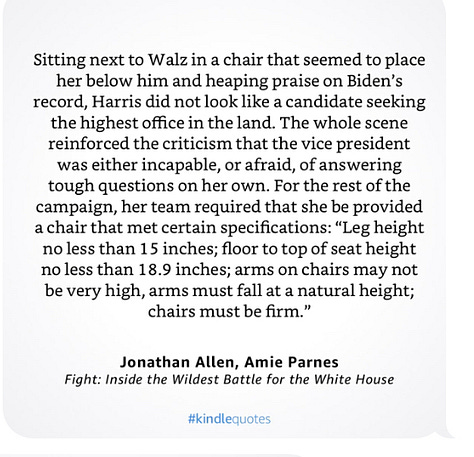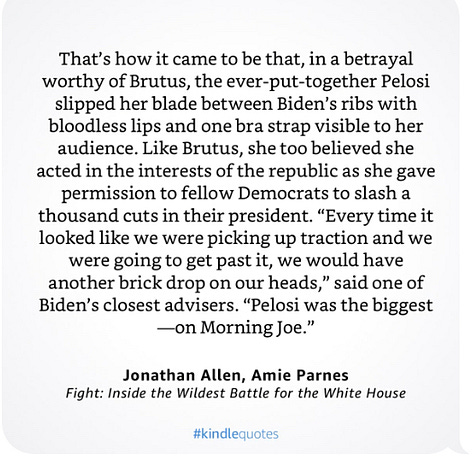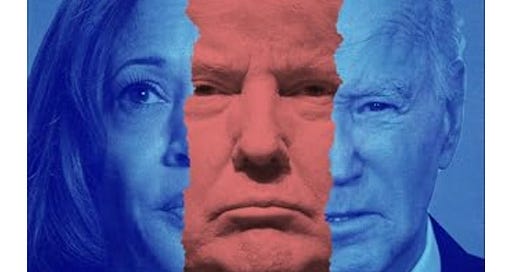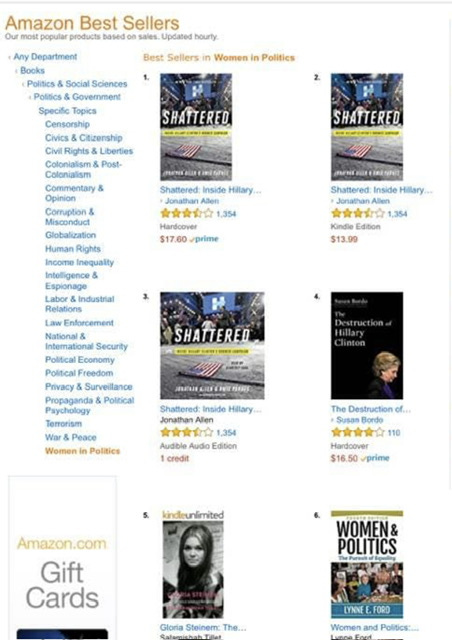“Dishy” or Just Trashy? How “Fight” Normalizes Trump, Dumps on Kamala, and Lets the Media Off The Hook For the Disaster of 2024
Jonathan Allen and Amie Parnes go for best-seller gold again, but as they did in “Shattered,” with mean-spirited trivia and a shallow narrative.
In 2017, I had the misfortune of having my own book on the 2016 election—The Destruction of Hillary Clinton— published the same week as reporters Jonathan Allen and Amie Parnes’ Shattered.
My book attributed the outcome of the election to multiple factors, from Bernie Sanders’ fragmenting of Democratic support for Hillary to James Comey’s eleventh hour revival of hysteria over Hillary’s emails. But what I considered to be most newsworthy about my book was my detailed, virtually week-by-week account of the ways in which the mainstream media, print journalism as well as both networks and cable news, helped elect Trump.
Outside of the right-wing media, there were few explicit endorsements of Trump’s candidacy, and many of Hillary’s. But endorsements counted little after a year in which headlines, chyrons, and “breaking news” had consistently served as a conveyor-belt and mass disseminator of everything that got thrown against Hillary Clinton and onto the radar screen, no matter how ill-founded. Mainstream coverage of the election gave “bad optics” the prominence of established fact. The narrative of “untrustworthy Hillary” was established early on, and continually replayed via various episodes—including a bout with pneumonia that got alchemized into major suspicions about “what she was hiding.” Headlines paid more attention to the (often disinformation-based) content of every leaked email than the much more significant story of the Russian origin of the leaks. The media continually declared “momentum” for Sanders and Trump and “lack of enthusiasm” for Hillary and provided enormous free air-time to the big rallies and big crowds rather than Clinton’s more low-key, but as it turned out, prescient campaigning. Virtually every day we were served up a steady stream of “suspect” optics, self-validating polls, false equivalences and pseudo-crimes — the “email scandal” being the paradigm, but not the only, illustration — that made Hillary out to be “just as bad” as (and for some, worse than) Trump. Seems insane now, doesn’t it?
A lot of this will be old news to many of you. But the fact is that so far, the mainstream media has resisted owning any of it.
I personally ran into this resistance head-on when for a brief moment after The Destruction of Hillary Clinton was published, MSNBC seemed interested in it. Invited for an interview that took place on April 15, 2017, I was nervous, excited, and hopeful that my account—the first to put the blame on factors other than Hillary herself—might get some attention. It was shocking to see the promo for the interview: “Next up: The author of a new book argues that Clinton made one big mistake that probably cost her the presidency.” And there on the chyron, in bold letters: “CLINTON’S BIGGEST MISTAKE.”
Turned out, according to then-Saturday mid-day host Sheinelle Jones, that I had argued Clinton’s “big mistake” was that “she allowed the media to shape the narrative.”
Allowed?
“You underestimate the media’s power,” I said to Sheinelle. I had plenty of examples ready. But Sheinelle didn’t want to go there, and didn’t follow up by asking me what I had in mind. Instead, after a video of a Trump rally, and those now-famous cries of “lock her up, lock her up!” (Pretty disgusting to be sure, but not what I meant when I wrote about “optics”) she headed to the familiar Clinton-blaming narrative, and produced a visual detailing the points made in a “blistering commentary” (as she put it) by Andrew Sullivan: Hillary Clinton put Trump in the White House, she mishandled her campaign, she spent too much time fund-raising among wealthy donors, didn’t visit the Rust Belt states, didn’t communicate with the “working class.” Etc. Etc.
I’d heard all this multiple times, from the earliest post-mortems on the results of the election, in which Sanders enthusiast Michael Moore joined Chris Mathews in dissecting Hillary’s “disgraceful campaign” (as Moore described it.) But what the hell, I’d give it one last try. So I said I didn’t buy Sullivan’s narrative. I went on to remark that working class people work, and have little time to follow hearings and speeches as they happen, but depend on headlines and the media’s sound-bytes early in the morning and after work--and what they got from those fragments was often lifted from right-wing talking points, premature, or just plain factually inaccurate.
It was no surprise for me to hear from Sheneille that we were “out of time.” “We will be talking about this for a long time,” she summed it up. What she meant by “this” wasn’t clear to me, but it certainly wasn’t mainstream media malpractice. And then, just a few days after my own book was published, the media was let off the hook entirely, when Shattered came out.
Written by Jonathan Allen and Amie Parnes, media-insiders and at that time familiar faces on MSNBC, Shattered was advertised as a “dishy,” "tell-all" about the "inside" of the Clinton campaign, where we got confirmation that Hillary ran a terrible campaign, was nasty to her staff, and made the familiar fatal blunders of ignoring key parts of the country. Scant mention of Comey. Russia a passing aside. Sexism? Barely discussed, but frequently exhibited. (Example: (“Hillary’s severe, controlled voice … carried the sound of a disappointed teacher or mother delivering a lecture before a whipping”) And of course, no mention of media responsibility. All this was juicy meat for most of the reviewers (One headline even read “Hillary even witchier than we thought"). And despite the absence of attribution of sources (which I can understand, given the surplus of nasty) it was applauded as a rigorous, objective piece of journalism and embraced as the official narrative of Clinton’s 2016 electoral loss.
My book was written. I was proud of it. I knew it had the facts on its side. I felt I had done right by Hillary without sacrificing truth or complexity. Was I irritated when Shattered climbed to the top of the bestseller list and my own book got disappeared by the media?1 Yeah, I was angry about that. But I consoled myself with what I thought then was the probability that eventually the mainstream media would own up to its role in what would turn out to be the most disastrous mistake in electoral history.
It hasn’t happened yet. A couple of tepid “mea culpas” here and there about the outsize attention paid to Hillary’s emails. But the last thing the mainstream media will do is blame itself for anything.
And now, the Allen/Parnes team is doing it again, with Fight: Inside the Wildest Battle for the White House. That word—“inside”—is sure to tempt readers eager for never-before-revealed scoops available only to the “seasoned” and “trusted” journalists who are sure to be invited on show after show, just as had been the case with Shattered.
I didn’t notice any such “scoops”—unless you consider Nancy Pelosi’s not applying her “signature” red lipstick or adjusting her bra-strap before a crucial Morning Joe appearance, or the Harris campaign’s “demand” for certain chair-dimensions in interviews to be big news.2 And while the authors are unrestrained in traveling into the minds of Pelosi, Obama, and others and reporting as fact what they imagine going on in there (mostly, thoughts about what a poor candidate Kamala would be) their perspective on Trump’s campaign goes nowhere near “inside” anything.



Some of their acceptance of the Trumpian version of things is fairly trivial (for example, they don’t question the never-validated account of what/how much damage was done to Trump’s ear in the assassination attempt.) Other omissions are more serious: the only (very passing) mention of Project 2025 is Trump’s denial of knowing anything about it. “Elon Musk flits through as an oddball, smoking pot with the podcaster Joe Rogan. Stephen Miller, by most accounts the dominant policy-oriented brain in the current administration — plainly the case in the Signal chat incident about Yemen — shows up as little more than a name.”3
It’s pretty clear that while Allen and Parnes, who used to write for Politico and frequently appear on MSNBC, got access to a lot of “background” (that is, not to be attributed) dissing among the Democrats, the Trump campaign wouldn’t let them anywhere near. That’s not surprising. But it doesn’t lend much credence to the claim that Fight actually covers the “battle” for the White House. More of it is devoted to Biden’s resistance to leaving the race and the lack of faith key Democrats had in Kamala than to events that occurred once the contest between Kamala and Trump was underway. Allen and Parnes’ barely-argued-for takeaway on that contest: Kamala never explained her “reason for running” (uh, to make life better for Americans and try to save the nation from Trump?) and the notion that what Kamala needed was more time, they insisted as though delivering a knock-out blow, is belied by the fact that she peaked early, then faded. In fact, she might have won, the authors argue, if the election was sooner, allowing her to be carried too victory on the initial wave of enthusiasm for her after Biden finally got out and before her flaws were exposed.
As for Trump, they leave the reader with the impression that he ran an almost flawless campaign (they don’t say “flawless,” but they don’t need to, as throughout the book, the only serious misstep they attribute to Trump is his accusation of Harris “having become Black”) and a deserved victory. The book opens with a torturously drawn-out account of Biden’s debate performance, from “His face is so pallid, Pelosi thought” to the “cavalcade of stumbles” and “word salad” that showed he was “bereft of coherent thought,” but has no criticism whatsoever of Trump’s disconnected barrage of lies, false accusations, and evasions. The last line of the book has Trump at “the moment of reward” tell his followers, “We’ve been through so much together, and for the next four years, I will fight for you.”
The “Kamala didn’t need more time” argument ignores the fact that normal-length campaigns often have several ups-and-downs, and can turn on unexpected surprises, as was arguably the case in 2016: Despite Sanders’s unwillingness to enthusiastically rally his troups for Hillary and the media’s constant harassment of her, Trump was in real trouble from the “Access Hollywood” tapes when Comey delivered that last-minute blow to Clinton’s campaign:
Who knows what might have happened if Kamala had had more time? Even given the short time she had, the narrative of her “riding a political wave” at the beginning (the “wave” metaphor treating early enthusiasm for her as a kind of “sugar high,” arising from relief at Biden’s departure, having nothing to do with Harris personally), then ebbing due to to her failure to both “define herself” or produce a solid “economic” prospectus, is not convincing, given the millions of dollars that Musk, relatively late in the game, had pumped into Trump’s disinformation-and-attack-machine, the sweet spots of misogyny and racism that drew disgruntled young bros to Trump, or how close the race, in fact, was. And sorry, but that “no economic message” thing is just plain false. 4
Allen and Parnes bolster their argument by placing enormous emphasis on “missteps” that journalists themselves had made into headline news (e.g. failing to distinguish herself from Biden in an answer on “The View”—a failure that journalists continually harped on, allowing her no credit for protectiveness or even simple curtesy to Biden) while underplaying her most dazzling successes, such as her debate with Trump. “By the traditional measures of debate optics, Harris ran circles around Trump,” they acknowledged, “she deployed her attacks as planned, unnerved him, and kept her cool.” But they added that “Trump landed serious blows” and “revealed the holes in Harris’s platform.” “Serious blows” and “holes” are not exactly how I remember that debate. Nor do I remember Kamala “enjoying” “an uninterrupted wave” of positive media attention for “nearly two months,” as Allen and Parnes claim. I do remember—and chronicled in my stacks throughout the election—how the media harassed her for not submitting to their own desires to interrogate and make “breaking news” with gotchas. Of course, that’s not how they would describe it:
What I remember was how Trump took advantage of the resentment of men who felt “unmanned” by all the women who they believed had taken the jobs that were rightfully theirs, and who knew a gorgeous, confident woman like Kamala would never be interested in dating them. They voted for Donald because they liked all the faults that Dems mistakenly thought they’d recoil from: saying whatever disgusting thing he wanted to, doing whatever he felt like, grabbing any pussies in his vicinity. They liked that he mangled language. They liked that he said “fuck you” to (what had been branded as) “woke” politicians—particularly the feminists. They didn’t want an accomplished, educated, articulate woman that made them feel “less than,” and they especially didn’t want a mixed-race woman with stature and confidence and a big laugh. They wanted a mirror of and permission to be themselves, just as they are.
What I remember is a corporate “liberal” media who badgered her—as they had Hillary—for ignoring their demands for “hardball” interviews, who criticized her for preferring “softball” conversations, who seemed to be determined, once they got her to “sit down” with them, to expose “flip-flops” and treated her discomfort in answering “yes or no” questions as “word salad.” What I remember are the headlines and chyrons and leading questions that were the only sources of “news” for many people. Did she have what it takes to be POTUS? Would she fall apart without a teleprompter? Are “vibes” and “joy” all she has to offer? Is there any “substance” to her? What I remember are all the (usually male) commentators blathering on about the groups she was “in trouble with” what she “needs to do.”
You won’t get any of that from Fight. What you will get is lots of gossipy chapters that emphasize why Kamala was a problem candidate, zero analysis and criticism of Trump’s campaign or the insidious planning and backing that went into it, and—surprise!—not a word about how the mainstream media (of which Allen and Parnes are members) empowered Trump and continually raised doubts about Harris.
They aren’t unique. In the hundreds of books and articles and interviews and panels that have “diagnosed” the disastrous outcomes of both 2016 and 2024, the mainstream media has never featured any discussions focusing on their own responsibility. The reason? It means taking themselves to task. The world of publishing/journalism is a tight club that protects its own. The New York Times and MSNBC aren’t about to devote space to a major expose of their failings.
Are Allen and Parnes aware of how badly the mainstream media has failed us in their “coverage” (so to speak) of these momentous, consequential elections? Are they aware of how their own books have failed both the future and history, by prizing “dishy” “scoops” and sales more than their responsibility to the narratives that, simply because they garner attention in that same media, get embedded in our collective understandings?
It’s kind of a vicious circle, isn’t it?
For a week-by-week account of the 2024 election, see the pull-down “Election Watch 2024” tab on the BordoLines homepage.
For the 2016 election, see my book The Destruction of Hillary Clinton: Untangling the Political Forces, Media Culture, and Assault on Fact That Decided the 2016 Election
It was the first book of mine that received no reviews in the mainstream press..
For my different take on this interview (with Dana Bash) see:
https://www.washingtonpost.com/books/2025/04/02/fight-jonathan-allen-amie-parnes-trump-biden-harris-review/
Kamala didn’t bellow like Sanders, but she did propose an “opportunity economy” that had actual plans (not just “concepts” of plans) for making the cost of housing, child-care, senior-care, education less back-breaking. She didn’t talk metaphorically about “kitchen table issues”; she recalled the actual kitchen table at which her actual working-class mother sat, figuring out how to pay the bills. She vividly described the everyday challenges of caring for aging parents—and proposed actual dollars that would help buy the soothing lotion for papery skin. And she insisted that reproductive choice and access was itself an “economic issue.”
Could it be her examples and emphases were too female-oriented to be taken seriously as “an economic agenda”?
For more on gender and the 2024 election, see (among others):











Just incredible reporting, Susan. I'm fascinated by American politics. It was interesting how you said that everyone was commenting on Clinton's honesty, what she was hiding but barely questioned Trump's. Think about it, why was there such a disparity in reporting, it was pure envy by the boys and men who never got a chance to know what it was like to always overpower women. If I've understood this correctly, Trump appealed to the men and boys who have felt disenfranchised for the last five or six decades. These kids look back at what Don Draper had in the 50s, and that has "largely" disappeared in Anglo countries. They want to be powerful, and they certainly don't want to get laughed at by women, their greatest fear. Anyway, ranting. You're very provocative and that's so rare in journalism.
I'll warn my dad away from this book, just as I've warned him away from the bitter-AF-Alex Thompson and Jake Tapper book. TY for the thorough debunking.